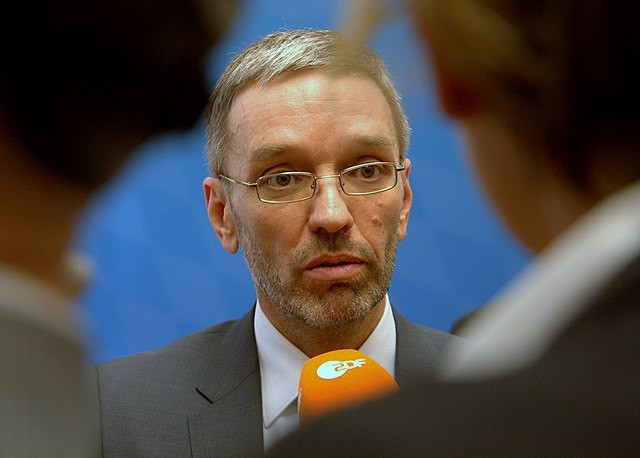Austria's far-right Freedom Party (FPÖ), led by Herbert Kickl, achieved a significant victory in the nation's parliamentary election, becoming the first far-right party to win such an election since World War II. With 28.8% of the vote, the FPÖ secured its largest share ever, outpacing Chancellor Karl Nehammer's conservative People's Party (ÖVP), which garnered 26.3%. However, despite this electoral success, the path to forming a government remains uncertain for Kickl, as the majority of political parties have ruled out working with the FPÖ due to its hardline views.
Kickl, a controversial figure in European politics, celebrated the FPÖ's triumph as a "new era" for Austria and promised to translate the party's 29% vote share into political power. "Tomorrow there will be a blue Monday," Kickl told supporters, referencing the party's color, "and then we will set about turning that 29% into a political reality in this country."
The FPÖ's victory is part of a broader trend across Europe, where far-right, anti-immigration, and populist parties have gained ground in countries such as the Netherlands, France, and Germany. Despite these successes, far-right parties have often struggled to convert electoral wins into government power due to resistance from more moderate political factions. Austria's situation is no different, as most of the country's mainstream parties have already ruled out forming a coalition with the FPÖ.
The ÖVP, which placed second in the election, has previously formed a coalition with the FPÖ. However, Chancellor Nehammer has publicly ruled out working with Kickl, citing the FPÖ leader's embrace of conspiracy theories and controversial views. "You can't run a state sensibly and responsibly with him," Nehammer said, reiterating his opposition to any collaboration with the far-right leader.
This leaves the FPÖ in a difficult position. While it secured the largest share of the vote, it will need a coalition partner to govern, as required by Austrian law. President Alexander Van der Bellen, who oversees the formation of governments, has urged all parties to engage in negotiations, but the process is likely to be lengthy and fraught with challenges. Without a willing coalition partner, Kickl's victory may ultimately prove hollow.
Kickl has positioned himself as an anti-establishment figure and has drawn comparisons to Hungarian Prime Minister Viktor Orbán, with whom he shares many Eurosceptic and anti-immigration policies. He has also gained notoriety for promoting conspiracy theories, including endorsing ivermectin as a COVID-19 treatment. Kickl's opposition to sanctions on Russia and his support for withdrawing aid to Ukraine have further distanced him from Austria's political mainstream.
In the days following the election, Kickl has sought to downplay concerns about his leadership style, offering to negotiate with all parties. However, political analysts remain skeptical of his ability to build the alliances necessary to form a stable government. "The constant characterization of Kickl as a menace and the refusal of other parties to work with him risks strengthening his pitch as an outsider," noted political analyst Thomas Hofer. "Kickl only sees this as a confirmation of his anti-system narrative."
The FPÖ's success has reverberated across Europe, where far-right parties have been gaining momentum. However, as seen in countries like France and the Netherlands, electoral victories do not always translate into power. In France, the far-right National Rally won the first round of elections in June, only to be blocked by moderate parties in the second round. Similarly, Dutch nationalist leader Geert Wilders was unable to form a government despite winning the popular vote in the Netherlands.
Kickl's task is further complicated by internal divisions within Austria's political landscape. The ÖVP and the center-left Social Democrats (SPÖ) have dominated the country's post-war politics, and both parties have expressed strong opposition to working with the FPÖ under Kickl's leadership. There is speculation that the ÖVP may seek an alliance with the SPÖ, sidelining the FPÖ despite its electoral win.
Supporters of the FPÖ argue that the party's "Austria First" policies, which emphasize curbing illegal immigration and boosting the economy, resonate with a growing segment of the population. Critics, however, fear that the FPÖ's rise could signal a shift toward a more authoritarian state, drawing comparisons to Orbán's leadership in Hungary. Irene Rubik, a 69-year-old retired civil servant and Greens voter, voiced concern that Austria is at risk of "Orbanization," a term used to describe Hungary's gradual erosion of democratic norms.
The uncertainty surrounding the FPÖ's ability to form a government has left Austria in political limbo. If Kickl is unable to build a coalition, it could open the door for a potential alliance between the ÖVP and the SPÖ, both of which have dominated Austrian politics for decades. Such a coalition could stabilize the country, but it would likely further fuel Kickl's anti-establishment rhetoric and bolster his image as an outsider.




